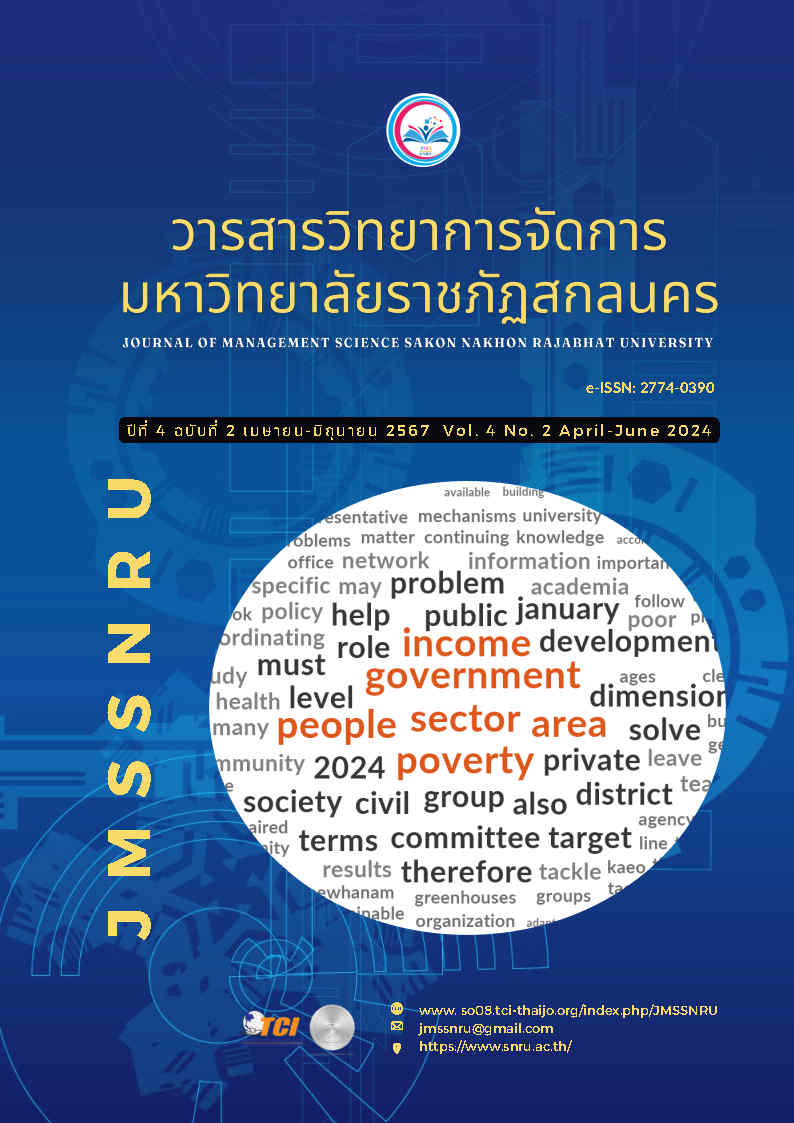ความตั้งใจเป็นผู้ประกอบการเพื่อสังคมของนักศึกษาระดับปริญญาตรี มหาวิทยาลัยเกษมบัณฑิต: การวิเคราะห์บนพื้นฐานการศึกษา ความหลงใหล ความฉลาดทางศีลธรรม และทุนทางจิตวิทยา
คำสำคัญ:
การศึกษาความเป็นผู้ประกอบการเพื่อสังคม, ทุนทางจิตวิทยาเพื่อความเป็นผู้ประกอบการ, ความหลงใหลในการเป็นผู้ประกอบการ, ความฉลาดทางศีลธรรม, ความตั้งใจเป็นผู้ประกอบการเพื่อสังคมบทคัดย่อ
การศึกษาเชิงประจักษ์ที่นำเสนอในบทความนี้มีวัตถุประสงค์เพื่อบ่งชี้ตัวแปรที่มีอิทธิพลต่อความตั้งใจเป็นผู้ประกอบการเพื่อสังคมของนักศึกษาระดับปริญญาตรี โดยคำนึงถึงปัจจัยหลัก 4 ประการได้แก่ การศึกษาความเป็นผู้ประกอบการเพื่อสังคม ความหลงใหลในการเป็นผู้ประกอบการ ความฉลาดทางศีลธรรม และทุนทางจิตวิทยาของผู้ประกอบการ ประชากร คือ นักศึกษาระดับปริญญาตรี จากมหาวิทยาลัยเกษมบัณฑิต 9,035 คน และใช้วิธีการสุ่มแบบชั้นภูมิคัดเลือกกลุ่มตัวอย่าง 400 คน เพื่อตอบแบบสอบถาม การวิเคราะห์การถดถอยพหุคูณและสถิติเชิงพรรณนาถูกนำมาใช้ในการวิเคราะห์ข้อมูลเชิงปริมาณ ผลการวิจัยพบว่า ตัวแปรอิสระทุกตัวมีอิทธิพลอย่างมีนัยสำคัญต่อตัวแปรตาม แบบจำลองการถดถอยพหุคูณระบุว่า การศึกษาความเป็นผู้ประกอบการเพื่อสังคมมีส่วนสนับสนุนความตั้งใจเป็นผู้ประกอบการเพื่อสังคมมากที่สุด โดยมีค่าสัมประสิทธิ์การถดถอยเท่ากับ 0.357 และค่าสัมประสิทธิ์การตัดสินใจที่ปรับแล้วเท่ากับ 0.627 สรุปได้ว่า การศึกษาความเป็นผู้ประกอบการเพื่อสังคม ทุนทางจิตวิทยาของผู้ประกอบการ ความฉลาดทางศีลธรรม และความหลงใหลในการเป็นผู้ประกอบการ เป็นปัจจัยที่สามารถอธิบายความตั้งใจเป็นผู้ประกอบการเพื่อสังคมได้มากถึงร้อยละ 62.7
เอกสารอ้างอิง
Bacq, S., & Alt, E. (2018). Feeling capable and valued: A prosocial perspective on the link between empathy and social entrepreneurial intentions. Journal of Business Venturing, 33(3), 333-350.
Cardon, M. S., Gregoire, D. A., Stevens, C. E., & Patel, P. C. (2013). Measuring entrepreneurial passion: Conceptual foundations and scale validation. Journal of Business Venturing, 28(3), 373–396.
Dhiramitr, S., Pratoom, K., & Savatsomboon, G. (2022). Quotient factors affecting job success of personnel of provincial commercial officer in Thailand. Journal of Modern Learning Development, 7(2), 120–134.
Fatoki, O. (2018). Determinants of Social Entrepreneurial intentions of university students in South Africa. Journal of Economics and Behavioral Studies, 10(6A), 72–80.
Hassan, H. M. K., Igel, B., & Shamsuddoha, M. (2022). Entrepreneurship education and social entrepreneurial intentions: The mediating effects of entrepreneurial social network. Retrieved May 23, 2023 from https://www.ncbi.nlm.nih.gov/pmc/articles/PMC9150754/pdf/fpsyg-13-860273.pdf.
Hobfoll, S. E. (2002). Social and psychological resources and adaptation. Review of General Psychology, 6, 307–324.
Huyghe, A., Knockaert, M., & Obschonka, M. (2016). Unraveling the “passion orchestra” in academia. Journal of Business Venturing, 31(3), 344–364.
Keat, O. Y., Selvarajah, C., & Meyer, D. (2011). Inclination towards entrepreneurship among university students: An empirical study of Malaysian university students. International Journal of Business and Social Science, 2(4), 206–220.
Khattiya, S., & Pomlaktong, N. (2019). Social Enterprises and Sustainable Aational Development. Journal of Management Science Review, 21(1), 145–154.
Kibler, E., & Kautonen, T. (2016). The moral legitimacy of entrepreneurs: An analysis of early-stage entrepreneurship across 26 countries. International Small Business Journal, 34(1), 34–50.
Kuehn, K. W. (2008). Entrepreneurial intentions research: Implications for Entrepreneurship education. Journal of Entrepreneurship Education, 11, 87–98.
Liñán, F., & Chen, Y. (2009). Development and Cross–cultural application of a specific instrument to measure entrepreneurial intentions. Entrepreneurship theory and practice, 33, 593–617.
Luthans, F., Avolio, B. J., Avey, J. B., & Norman, S. M. (2010). Positive psychological capital: Measurement and relationship with performance and satisfaction. Journal of Personnel Psychology, 60, 541–572.
Luthans, F., Youssef, C. M., & Avolio, B. J. (2007). Psychological capital: Developing the human competitive edge. New York: Oxford University Press.
Mahfud. T., Triyono, M. B., Sudira, P., & Mulyani, Y. (2020). The influence of social capital and entrepreneurial attitude orientation on entrepreneurial intentions: the mediating role of psychological capital. European Research on Management and Business Economics, 26(1), 33–39.
National Statistical Office. (2022). Labor Force Survey, 1st Quarter 2021. Retrieved May 1, 2023 from http://www.nso.go.th/ sites/2014en/Survey/social/labour/LaborForce/2021/summary1_64.pdf
Naveed, M., Zia, M. Q., Younis, S., & Shah, Z. A. (2021). Relationship of individual social entrepreneurial orientations and intentions: Role of social entrepreneurship education. Asia Pacific Journal of Innovation and Entrepreneurship, 15(1), 39–50.
Newbold, K. F., & Erwin, T. D. (2014). The education of entrepreneurs: An instrument to measure entrepreneurial development. Journal of Business and Entrepreneurship, 26(1), 141–178.
Solomon, G. T., Alabduljader, N., & Ramani, R. S. (2019). Knowledge management and social entrepreneurship education: Lessons learned from an exploratory two-country study. Journal of Knowledge Management, 23(10), 1984–2006.
Vallerand, R. J., Blanchard, C., Mageau, G. A., Koestner, R., Ratelle, C., Léonard, M., Gagné, M., & Marsolais, J. (2003). Les passions de l’ame: On obsessive and harmonious passion. Journal of Personality and Social Psychology, 85(4), 756–767.
Voda, A. I., & Florea, N. (2019). Impact of personality traits and entrepreneurship education on entrepreneurial intentions of business and engineering students. Sustainability, 11, 1–34.
Walter, S. G., & Block, J. (2016). Outcomes of entrepreneurship education: An institutional perspective. Journal of Business Venturing, 31(2), 216–233.
Wennekers, S., Van Wennekers, A., Thurik, R., & Reynolds, L. (2005). Nascent Entrepreneurship and the Level of Economic Development. Small Business Economics, 24, 293-309.
Wongrattana, C. (2012). Techniques for using statistics for research. Bangkok: Thepnaramit Printing.
Wang, Z., Li, J., & Yuan, D. (2017). The Impact of Social Capital on Opportunity Recognition of Social Entrepreneurs. Journal of China University of Geosciences (Social Sciences Edition), 17, 140-149.
Wang, A., & Yee, C. (2023). A Literature Review of Social Entrepreneurship. Open Journal of Business and Management, 11, 2232-2246.
ดาวน์โหลด
เผยแพร่แล้ว
รูปแบบการอ้างอิง
ฉบับ
ประเภทบทความ
สัญญาอนุญาต
ลิขสิทธิ์ (c) 2024 วารสารวิทยาการจัดการ มหาวิทยาลัยราชภัฏสกลนคร

อนุญาตภายใต้เงื่อนไข Creative Commons Attribution-NonCommercial 4.0 International License.
บทความที่ตีพิมพ์ในวารสารวิทยาการจัดการ มหาวิทยาลัยราชภัฏสกลนคร เป็นทัศนะ ลิขสิทธิ์ และความรับผิดชอบของผู้เขียนเจ้าของผลงาน






